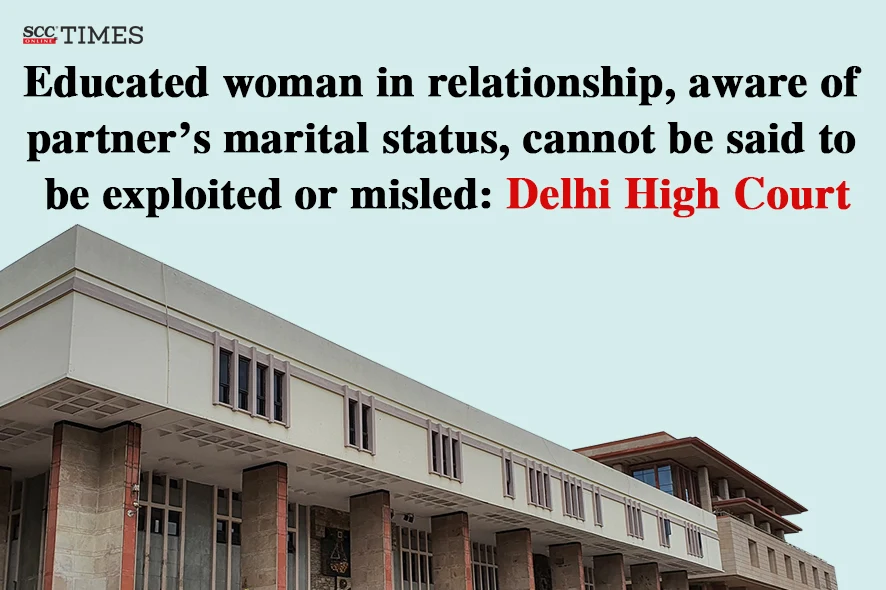Delhi High Court: In an application filed by the accused, under Section 482 of the Criminal Procedure Code, 1973 (‘CrPC’) for quashing of FIR for commission of offence punishable under Section 376 of the Indian Penal Code, 1860 (‘IPC’), the Single Judge Bench of Dr. Swarana Kanta Sharma, J, opined that the complainant, being an educated woman, aware of her partner’s marital status, could not be said to have been misled or exploited in law. Thus, the Court held that the relationship between the parties was consensual and that consent had not been obtained on false pretext of marriage, and therefore, quashed the FIR in question.
Background
The complainant was a 24-year-old woman living in Delhi pursuing higher studies and preparing for competitive exams like UPSC. She alleged that she had been subjected to severe exploitation, physical, emotional and sexual harassment by the accused under false pretext of marriage coupled with fraud and cheating. The accused and the complainant had met for the first time in Patna in presence of their respective families for the prospect of arranged marriage, however since a demand of dowry of Rs 1 crore was raised, the marriage proposal did not fructify. Nevertheless, the accused and the complainant had befriended each other the complainant had, on several places and occasions, accompanied the accused to hotels wherein they had established sexual relations.
According to the complainant, she had come to know that the accused had gotten married to Ms. X for the consideration of Rs. 60 lacs as dowry but the accused kept insisting that he had been married against his will. When the complainant and the accused met during her pregnancy, he had assured her that he would leave his wife and take responsibility for her and their unborn child. The complainant had also averred that the accused had threatened her and her family with dire circumstances, provoked her to commit suicide and subjected her to mental harassment.
Per contra, the accused submitted that the complainant and he had gotten married in 2024, at an Arya Samaj Mandir in Bihar. He substantiated his claim with a marriage certificate issued by the Mandir and verified by the Investigating Officer during investigation. He further contended that since the complainant was unwilling to have the marriage socially recognized, he married Ms. X under the pressure of his family.
Analysis, Law and Decision
The Court stated that for attracting the offence of rape on the ground that consent was obtained on the false pretext of marriage, the prosecution must establish that the sexual relationship between the parties had been induced by a false promise of marriage from the very inception, and that the accused never had any intention of marrying the complainant. However, in the instant case, the fact that the parties had gotten married in 2024 negated the allegation that the accused had no intention to marry the complainant.
The Court noted that the material-on-record indicated that the complainant and the accused had travelled together to different parts of India, stayed at various hotels, and established physical relations voluntarily. Significantly, the material also indicated that even after the complainant had come to know that the accused had contracted another marriage with Ms. X, she continued to accompany him and maintained sexual relations with him. The Court observed that such circumstances lent credence to the contention of the accused that the relationship between the parties was consensual and not induced by a false promise of marriage.
The Court considered the complainant’s assertion that no marriage had been solemnised at Arya Samaj Mandir and that the certificate presented was fabricated and backdated. If this claim were true, it would raise a question as to why the complainant continued an intimate relationship with the accused even after learning that he had married another woman, thereby making any subsequent marriage between them legally untenable.
Conversely, if the complainant’s position was that a valid marriage did take place between her and the petitioner, then the allegation of rape on the false promise of marriage could not be sustained, since the relationship would have been between legally wedded spouses.
The Court opined that in either scenario, the record did not reveal any material to suggest that the physical relationship between the parties was anything other than voluntary and consensual.
The Court further stated that the law on rape is meant to safeguard women’s bodily autonomy and punish coercion or deception that undermines genuine consent, not to resolve disputes between consenting adults who later part ways. When an educated, independent woman knowingly continues a relationship despite being aware of the accused’s marital status, it cannot be claimed that she was misled or exploited in law.
Thus, the Court, in exercise of its powers under Section 482 of the CrPC, quashed the FIR alleging commission of offence under Section 376 of the IPC.
[Ankit Raj v. State of NCT of Delhi, 2025 SCC OnLine Del 5894, decided on 3-9-2025]
Advocates who appeared in this case:
For the Petitioner: Suryanarayan Singh, Senior Advocate, Raman Yadav, Priyam Kaushik, Aashi Arora, Harshith Pottangi, Akriti Chaturvedi, Ritika Arora, Advocates
For the Respondent: Naresh Kumar Chahar, APP, SI Soni Lal, P.S. Nabi Karim





judgements upon allegation of married woman of sexual assault to married man having consensual relationship